unitsocialcommunicationppt课件
八年级下册英语课件-Module 1 Social communication Unit 2 Body language 课件2 上教版
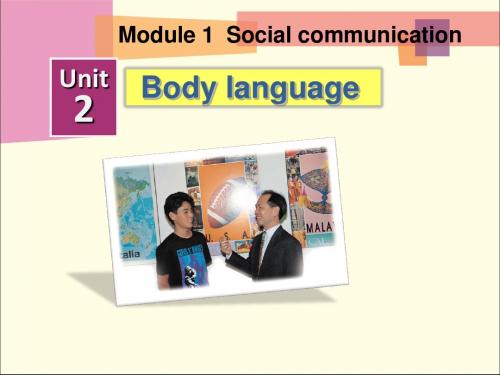
In pairs, ask and answer questions on the page of 24. Follow the example. 1. S1: What can shaking your closed hand show? S2: Shaking your closed hand can show that you’re angry. 2. S1: What can resting your head on your hand show?
S1: What about Qingdao? The beach city is a perfect place for the summer holidays. S2: Qingdao is a good place, but it’s a bit far away from here. We want a short trip. S1: Well, you’d better find some ideas for a short trip in a travel guide. S2: That’s a good idea. Thank you. S1: You’re welcome.
• Gerunds are often uncountable. We do not add a or an before them. • A gerund can have its own object. Debbie loves reading poems.
Gerunds as subjects
In pairs, read the example below. Pay attention to the words in blue. S1: What’s the matter? S2: I’m thinking about going somewhere nice during the summer holidays with my parents. S1: Why don’t you go to Harbin? It’s cool there in summer. S2: I went there last summer.
语文版中职英语(拓展模块)Unit 1《Social Communication》ppt课件2

7. Whenever 无论何时(引导让步 状语从句)
• Eg: You may come and get whenever you are free. 无论什么时候有空,你都可以来拿。
Sum up
• • • • • • • 1. be tolerant of宽容 2. have trouble /difficulty doing sth 做某事有困难 3. pretend to do sth 假装做某事 4. ask for 要求 5. It is +adj.+for sb to do sth. 6. leave sb doing sth 留下某人做某事Leave out 遗忘,忽略 • 7. whenever 无论何时
Unit 1 Social Communication
Warming up
• Have you ever talked with an English native speaker? • What would you do when you don’t know how to say something in English?
have no/some trouble doing sth
• Eg: The young lady has trouble solving her family’s problems. 这位年轻的女士在解决家庭问题上有困难。
We had no trouble communicating with each other. 我们在与彼此的交流上没困难。
4. ask for 要求
Eg: We ask parents for money every week.
5. It is +adj.+for sb to do sth.
八年级英语下册 Module 1 Social communication Unit 1 Helping those in need教案 牛津深圳版
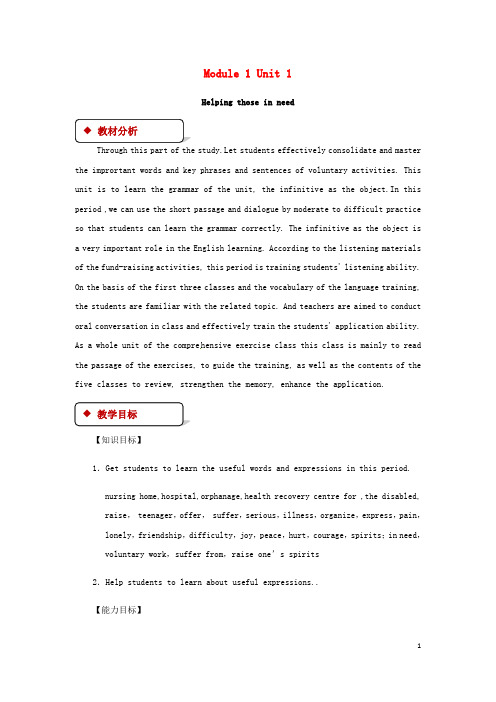
Module 1 Unit 1Helping those in need◆教材分析Through this part of the study.Let students effectively consolidate and master the imprortant words and key phrases and sentences of voluntary activities. This unit is to learn the grammar of the unit, the infinitive as the object.In this period ,we can use the short passage and dialogue by moderate to difficult practice so that students can learn the grammar correctly. The infinitive as the object is a very important role in the English learning. According to the listening materials of the fund-raising activities, this period is training students' listening ability. On the basis of the first three classes and the vocabulary of the language training, the students are familiar with the related topic. And teachers are aimed to conduct oral conversation in class and effectively train the students' application ability. As a whole unit of the compre hensive exercise class this class is mainly to read the passage of the exercises, to guide the training, as well as the contents of the five classes to review, strengthen the memory, enhance the application.◆教学目标【知识目标】1.Get students to learn the useful words and expressions in this period.nursing home,hospital,orphanage,health recovery centre for ,the disabled, raise, teenager,offer, suffer,serious,illness,organize,express,pain,lonely,friendship,difficulty,joy,peace,hurt,courage,spirits;in need,voluntary work,suffer from,raise one’s spirits2.Help students to learn about useful expressions..【能力目标】To be able to read a short passage and answer some question.【情感目标】1.Help them understand more about voluntary work.2.Develop students' sense of cooperative learning.【教学重点】How to train their ability step by step.【教学难点】1.Develop students' ability.2.Help students understand the difficulties.Multimediastep1 Getting ready1.1) Look at the cartoon and answer the questions.What did Hi mean by his words?What did Lo do?Did Lo understand what Hi mean?2) Think and sayWhat is voluntary work?step2. Brainstorm1)Brainstorm1Have you ever done any voluntary work ?Where can we do voluntary work ?nursing homehospitalorphanagehealth recovery centre forthe disabled2)MatchWhat kind of people can we help at these places?nursing home people who have difficulty moving, seeing, hearing, etc. orphanage the oldhospital people who are badly illhealth recovery centre for the distabled children without parents3)Brainstorm 2How can we do voluntary work ?help old peoplehelp raise moneyvisit sick children in a hospital4).What do you know about … ?There are many kinds of voluntary work. Can you match the activities with the Pictures below? Write the correct letters in the boxes.a helping disabled peopleb helping raise moneyc visiting an oid people’s homed visiting sick children in a hospitalstep3. Before you read1).Read the title, introduction and the writers’ names on page 3. Then answer the following questions.What are the names of the three teenagers?What did they offer to do during the school holidays?2).Look at the pictures, the writers’ names and the first sentence of each report on page 3. Write the correct names in the blanks.1. I talked to chidren without parents.2. I helped sick children .3. I taught disabled children to sing.I did some voluntary work in a chidren’s hospital.There are many children without parents.I wanted to help disabled children.Step4. While you read1.Read the first paragraph of Betty’s report and answer the following.I did some vountary work in a children’s hospital.The children there all suffer from serious illnesses.We organized a painting competition for them.Where did Betty do voluntary work?What is wrong with the children there?What did Betty and other volunteers do for the children?2.Read the first paragraphs of Mark’s and Annie’s reports and complete thetables.There are many children without parents.I met some of these children with my mother. We taught them to tell stories. This helps them express their feelings. One child said,"My friends don't understand my pain".I wanted to help disabled children.They have difficulty walking or moving.I taught them to sing because music can bring them joy and peace.3.Mark’s voluntary work4.Annie’s voluntary work5.Read th e second paragraph of Betty’s report and answer the questions.voluntary work, in the future.Whom did Betty help the most、What did Cindy want to do?How did Betty help Cindy?6.Read the second paragraphs of Mark’s and Annie’s reports and complete the sentences.We spent some time with a girl called Vivien.Her parents died in a car accident, and she is unhappy and very lonely.She needs friendship.My mother and i will continue to visit Vivien.I met a boy called Tim.He hurt his legs in an accident,but he has lots of courage. we need to help children like Tim and raise their spirits.I will continue to do voluntary work, in the future.Step5. After you readRead the passage aloud.Three teenagers offered to do some voluntary work during the school holidays. They wrote the following reports.I did some voluntary work in a children’s hospital. The child ren there all suffer from serious illnesses. We organized a painting competitio n for them.I met a girl called Cindy. She wanted to paint a picture of the park near her home.I went there and took some photos of it. Cindy used them for her painting.Betty There are many children without parents. I metsome of these children with my mother. Wetaught them to tell stories. This helps them express their feelings. One child said, “Myfriends don’t understand my pain.”We spent time with a girl called Vivien. H er parents died in a car accident, and she is unhappy and very lonely. She needs friendship. My mother and I will continue to visit Vivien.MarkI wanted to help disabled children. They have difficulty walking or moving.I taught them to sing because music can bring them joy and peace.I met a boy called Tim. He hurt his legs in an accident, but he has lots of courage. We need to help children like Tim and raise their spirits. I will continue to do voluntary work in the future.Annie Step6. VocabularyC1 The words in italics are from the reports on page 3. Circle the correct answers to complete these sentences.1. When spmething is serious,it is .a bad or dangerousb good or safe2. If you have an illness ,you are a person .a in good healthb in bad health3. If you have an illness ,you are .a nervousb not worried or excited4.A person with courage is usually of something dangerous or difficult.a afraidb not afraid5 If you raise something ,you .a make it lowerb move it higher6 If you are in high spirits,you have a good .a feelingb abilityStep7. Homework1.抄写单词和短语:raise,disabled,teenager,offer, suffer,serious,illness,organize,express,pain,lonely,friendship,difficulty,joy,peace,hurt,courage,spirits;in need,voluntary work,suffer from,raise one’s spirits。
语文版中职英语(拓展模块)Unit 1《Social Communication》ppt课件2

3. pretend to do sth 假装做某事
Eg: I pretended to not see her in the park. 我假装在公园没看见她。 Eg: The boy pretended to be reading book ,when the teacher came to see him . 老师进来时,男孩假装正在读书。
the last sentence
the first sentence the first sentence the first sentence
Careful reading
• Read the text again and list the etiquettes in the passage.
6. Leave sb doing sth 留下某人做某事
Eg:The mother left her little son standing in the sun.
妈妈让孩子晒在太阳底下。
Leave out 遗忘,忽略
Eg: He left out a letter so he made a big mistake in the sentence.
have no/some trouble doing sth
• Eg: The young lady has trouble solving her family’s problems. 这位年轻的女士在解决家庭问题上有困难。
We had no trouble communicating with each other. 我们在与彼此的交流上没困难。
Unit 1 Social Communication
Warming up
• Have you ever talked with an English native speaker? • What would you do when you don’t know how to say something in English?
unitsocialcommunication
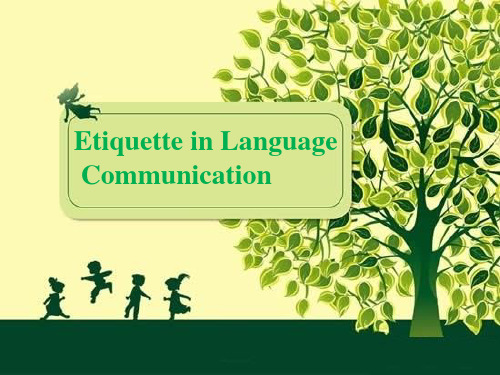
Social Communication
Reading
• Read the text “ Etiquette in Language Cofmimunication”again and complete the following sentences.
• 1)If you don't understand what is said to you, admit it and politely ask the person to repeat or explain .
What would you do when you don’t know how to say something in English?
What would you do when you don’t understand others in English?
Thank you
You are so beautiful in your new dress!
• 3)The polite response to a compliment about your looks or your work is“ thank you ”.
Social Communication
Reading
4)The response to“Thank you”is “ You are welcome ”
5)If someone asks "How are you?”just say “Fine,thanks,and you ”
At least tell your American friends so that they don't feel left out. 4.What would you say when people say to you,”You look great today!”
Unit 1 Social communication
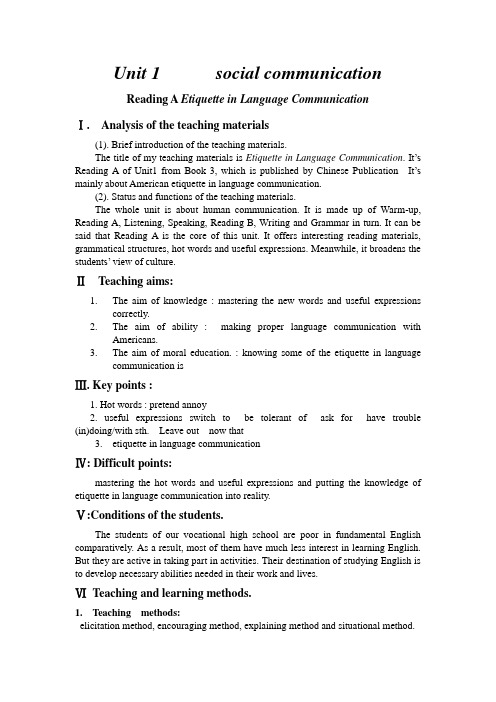
Unit 1 social communicationReading A Etiquette in Language CommunicationⅠ. Analysis of the teaching materials(1). Brief introduction of the teaching materials.The title of my teaching materials is Etiquette in Language Communication. It’s Reading A of Unit1 from Book 3, which is published by Chinese Publication It’s mainly about American etiquette in language communication.(2). Status and functions of the teaching materials.The whole unit is about human communication. It is made up of Warm-up, Reading A, Listening, Speaking, Reading B, Writing and Grammar in turn. It can be said that Reading A is the core of this unit. It offers interesting reading materials, grammatical structures, hot words and useful expressions. Meanwhile, it broadens the students’ view of culture.ⅡTeaching aims:1.The aim of knowledge : mastering the new words and useful expressionscorrectly.2.The aim of ability : making proper language communication withAmericans.3.The aim of moral education. : knowing some of the etiquette in languagecommunication isⅢ. Key points :1. Hot words : pretend annoy2. useful expressions switch to be tolerant of ask for have trouble (in)doing/with sth. Leave out now that3. etiquette in language communicationⅣ: Difficult points:mastering the hot words and useful expressions and putting the knowledge of etiquette in language communication into reality.Ⅴ:Conditions of the students.The students of our vocational high school are poor in fundamental English comparatively. As a result, most of them have much less interest in learning English. But they are active in taking part in activities. Their destination of studying English is to develop necessary abilities needed in their work and lives.ⅥTeaching and learning methods.1. Teaching methods:elicitation method, encouraging method, explaining method and situational method.2. learning methods :3. exploring, participating and practicing methodsⅦ: Teaching Design:carry on this lesson in six steps: lead-in, fast reading, intensive reading, practice, summary and homework, which take 2 minutes, 5 minutes, 20 minutes, 15 minutes, 2 minutes and 1 minutes respectively. Before I end this part, I’d like to display my design of writing on the blackboard.Ⅷ Teaching procedure:Step 1 Lead in (2’)Tell a story , showing some pictures with wrong manners → Find mistakesThen ask the question: “What are wrong manners?”The students needn ’t answer the questionStep 2 fast reading (5)read fast → showing the pictures again → give their answersThen ask the question: “What we should say/do here?”× ① ×② × ③ ×④Step 3 Intensive reading (20)1. read carefully ,then ask the question: “Why should we behave so?”2. key words and useful expressions → long sentences → expansionKey words and expressions:ok ① ok②?①? ② ? ④ ?③③ ok ③ ok④In this step, I’ll take three steps to present the key words and useful expressions. First, the usage. Then, show one or two model sentences. Last, to get the students to participate and practise, give them one or two sentences as exercises. The exercises can be in different forms, such as, filling in blanks, translating, correcting mistakes, and so on. All the exercises are done by the students themselves.be tolerant of/towards:Usage: be tolerant of/towards +n./ pron .Model sentences:1.Mr. Smith is not very tolerant of/towards others .2.We should always be tolerant of the views of others even if we disagree withthem.Exercises:1.Fill in the blank with the right form of the given words:Her own mistakes made her very____( tolerant) of/towards others.Have some/no trouble(in)…Usage: have some/no trouble(in) doing sth.Model sentences:I had some trouble (in) reading the letter . His handwriting is very bad.They had no difficulty in understanding what he said.Exercises:Translate the Chinese sentence into English:他们毫不费力就找到了我的家。
《单元主题写作》Communication PPT
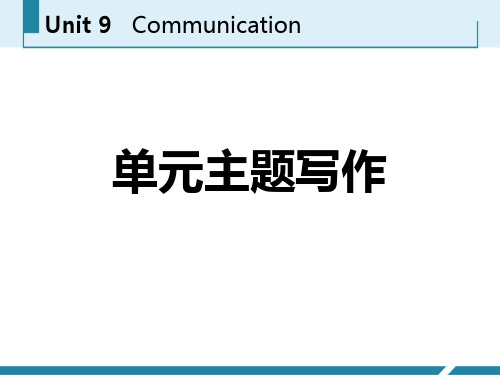
Finally, you should take turns to be the team leaders, so everyone wants to make the teamwork better.
单元主题写作
素材积累
重点短语 1.交朋友__m__ak_e_f_r_ie_n_d_s _(w_i_th_)_ 2.与某人相处_g_et_o_n_/_al_o_ng__w_it_h_s_b_. _ 3.互相理解__un_d_e_r_st_a_n_d_e_ac_h_o_t_h_er_ 4.守信___k_e_ep__on_e_'s_p_r_o_m_i_se__ 5.处于困境中_b_e_i_n_t_ro_u_b_le___
单元主题写作
In a word, smiling is a kind of language belonging to everyone. It passes love and friendship and helps shorten the distance between you and other people. Live with a smile, and every day will be shiny.
单元主题写作
注意事项: 1.词数:100词左右(文章开头已给出,不计入总词数); 2.文中不能出现真实姓名、校名等信息: 3.文章必须包含所提供的主要信息,并作适当发挥。
单元主题写作
Building better teamwork Teamwork can have a good influence on students' daily study. But _________________________________________________________ _________________________________________________________ _________________________________________________________
语文版中职英语(拓展模块)Unit 1《Social Communication》ppt课件1

should be honest and friendly.
• 1.Americans are usually tolerant of nonnative speakers ( who have some trouble understanding English .)
• 6.Now that you've studied this quick overview of manners in the US, you're ready to be polite in English.
• 既然你已经对美国礼仪有了简要的了解,你就完 全可以有礼节地使用英语了。
• now that...“既然„„”,引导让步状语从句,例如:
• You'd better leave the windows open.你最 好让窗户开着。
• His illness left him with a weak heart.他的 病导致他心脏虚弱。
• 4.If you must switch to your native language to explain something to a nonEnglish speaker, at leas‘tell your American friends so that they don,t feel left out.
• Now that you have come,you may stay here for some days.
• 既然你来了,就在这儿呆几天吧。
• Now that you are alone,you can speak freely. 既然是你一个人,你就可以随便说 了。
Module 1 Social communication Unit 1 Helping those in need 课件1 (2)
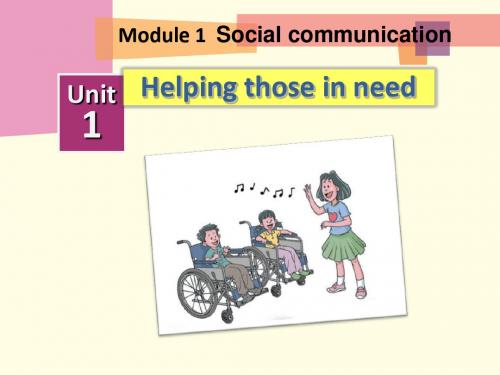
Check your answers
Read the three reports and complete the table below.
Volunteer’ Problem with s name the children
His/Her way of helping them
Reason for doing
Third report
Annie tells how she helped _d_is_a_b_l_e_d__ ____c_h_i_ld_r_e_n___ by ______te_c_h_i_n_g_t_h_e_m_ __to__s_in_g____.
Betty’s report
Read Betty’s report and rearrange the following pictures. Then retell the story of how Betty helped Cindy.
Whom did Betty help the most? Cindy .What did Cindy want to do?
She wanted to paint a picture of the park near her home. How did Cindy help Cindy?
Betty went to the park near Cindy’s home and took some photos of it. Cindy used the photos for her painting.
I met a girl called Cindy. She wanted to paint a picture of the park near her home. I went there and took some photos of it. Cindy used them for her painting.
Unit 1 Reading Module 1 Social communication

d
a
Before you read
Read the title, introduction and the writers’ names on page 3. Then answer the following questions.
teenager
Look at the pictures, the writers’ names and the first sentence of each report on page 3. Write the correct names in the blanks.
Unit Module 1 Social communication
1
Helping those in need
Period 1
Getting ready
Look at the cartoon and answer the questions.
Reading voluntary work Think and say
Read the second paragraph of Betty’s report and answer the questions.
Cindy. She wanted to paint a picture of the park near her home. Betty went to the park near Cindy’s home and took some photos of it. Cindy used the photos for her painting.
While you read
Read the first paragraph of Betty’s report and answer the following
中职英语拓展模块Unit 1 Social Communication
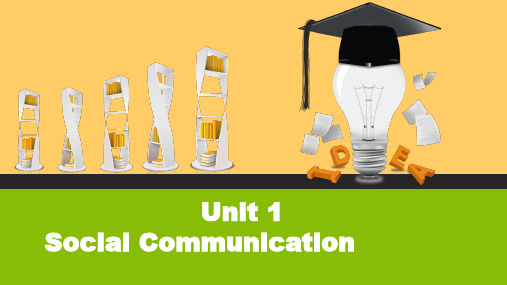
can go to university.
in order that
She's studying English at night school in order to
go to university.
表目的
目的状语从句 Adverbial Clause of Purpose
Grammar
You can copy down my answers, although I’m
Etiquette in Language Communication
have trouble/difficulty (in) doing
做…有麻烦/困难 He is having trouble getting his message across to the voters. They had difficulty in finding a hotel.
Etiquette in Language Communication
Although; But 尽管;但是
Although in poor health, she continued to carry out her duties. You can copy down my answers, although I’m not sure they’re right. It’s an old car, but it’s very safe. We’ve invited the boss, but she may decide not to come.
Etiquette in Language Communication
Do’s
1. Do learn some polite expressions.
英语拓展模块unit 1《social communication》ppt课件(1)

Etiquette In language communication
Warming Up
• 1.Look at the picture of unit 1 and what can you see in it?
• --…is/are talking about … with… • 2. Do you think it’s a smooth (流畅的、顺
利的)communication?
Thank you
You are so beautiful in your new dress!
Thank you for your help
You’re welcome! It is ok. it is nothing.
I’m fine. Thank you. and you?
• They wanted her to give them a quick answer.他们想要她给一个简短的答复。
What should we do to make us have good manners?
1.When you are on a bus, you see an old man… 2.When others are in trouble… 3.When others are talking… 4.When you want to sneeze or cough in public…
精品八年级英语下册Module1SocialcommunicationUnit2Bodylanguage课件牛津深圳版
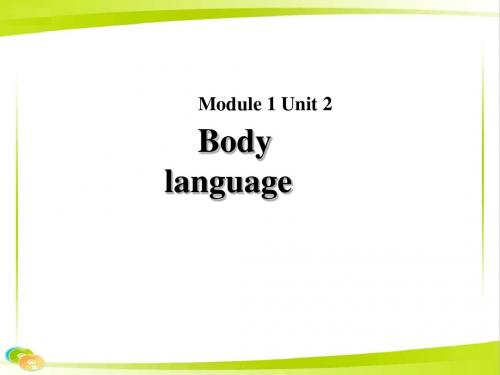
1 wearing nice clothes (line 3)
_____w_
2 a polite word for a woman (line 3)
_______
3 the look on one’s face (line 13)
__e or something looks (line 14) _______
√
bored
√
4 Which person looks friendlier, the boy or the girl? The girl.
Read the introduction, the first two and last two paragraphs and comple
A well-dressed lady entered the office. She looked at Debbie and Simon, and then walked over to Debbie. Debbie gave her a cheerful greeting. Simon sighed and walked away.
What is body language ?
eye m
Play a game
sigh look down
What’s the function of body language?
Body language helps us communicate with others. body language can help us make a good impression o
excited
Before you read
B Look at the photo, the title and the introduction to the story on page 19. Then answer the questions below.
social communication(ppt)

Dr. Zunin:
The author declares that interpersonal relations should be taught as a required course in every school, along with reading, writing, and mathematics. In his opinion, success in life depends mainly on how we get along with other people. That is at least as important as how much we know.
There is a time for everything: Things should be done at the proper time. Play-acting: Pretending; behaviour intended to hide your real thoughts and feelings. Complain about/of: To say that one is unsatisfied, annoyed or unhappy about something or someone
Class Discussion:
Can you always be “totally honest” to anyone beside you? Why?
My personal opinion:
I don’t think that “total honesty” can apply to a person with whom you haven’t been familiar. A man usually hide some of his true feelings or personal defects before others. It does not mean that people are hypocritical but reveals a kind of instinct ion of us mankind.
英语拓展模块unit 1《social communication》ppt课件(1)

be annoyed with sb. “生……的气” be annoyed at sth. “讨厌某事/物”
eg: • He is never annoyed with me . 他从来不
3. Thank you. 4. The really good manners in communication
should be honest and friendly.
• 1.Americans are usually tolerant of nonnative speakers ( who have some trouble understanding English .)
• 其次,你用母语和一个人交谈而让美国朋 友冷落一边是非常不礼貌的。
• 句中it作形式主语,不定式短语to talk with a person in your native language and leave your American friends standing there作真正主语。
• 句中的leave是及物动词,在句中是“让„„ (处于某种状态)”的意思,其 Don’‘1eave her standing outside in the rain. 不要让她在外面雨中站着。
利的)communication?
Thank you
You are so beautiful in your new dress!
Thank you for your help
You’re whing.
I’m fine. Thank you. and you?
• You'd better leave the windows open.你最 好让窗户开着。
- 1、下载文档前请自行甄别文档内容的完整性,平台不提供额外的编辑、内容补充、找答案等附加服务。
- 2、"仅部分预览"的文档,不可在线预览部分如存在完整性等问题,可反馈申请退款(可完整预览的文档不适用该条件!)。
- 3、如文档侵犯您的权益,请联系客服反馈,我们会尽快为您处理(人工客服工作时间:9:00-18:30)。
• 1、Master the key words and expressions
• 2、Fast reading • 3、Be polite in English
Social Communication
Warming up
Have you ever talked with an English native speaker?
4)The response to“Thank you”is
“You are welcome
”
5)If someone asks "How are you?”just say
“Fine,thanks,and you
tell your American friends,
out
they don’t
.
thank you
• 3)The polite response to a compliment about your
looks or your work is“
”.
Social Communication
Reading
Social Communication
Reading
• Read the text “ Etiquette in Language Cofmimunication”again and complete the following sentences.
• 1)If you don't understand what is said to aydomui,t
If you don't understand what is said to you,admit it and politely ask the person to repeat or explain.
Social Communication
Reading
3. If you must switch to your native language, what should you do?
Thank you for your help
You’re welcome! It is ok.
I’m fine. Thank you. and you?
How are you?
Social Communication
New words
human rude
annoy native face
compliment politely
it anpdolite
ask threeppeearston teoxplai
or ly
.switch to your natiavte language to
explain somethinsgottohatnon-Englisflheeaslsptelaekfetr,
• 5.lost
E.say
SUCCESS
THANK YOU
2019/5/18
Social Communication
Reading
• 1.human
A.talk
with,communication
• 2.etiquette
B.man,person
• 3.annoy
C.manner,way
• 4.rude sb.angry,unhappy
At least tell your American friends so that they don't feel left out. 4.What would you say when people say to you,”You look great today!”
We should say “Thank you”in response.
D.make
• 5.conversation E.impolite
Social Communication
Reading
Fast Reading
After reading, answer the following questions.
Social Communication
Reading
1.Why are foreigners usually tolerant of non-native speakers? 2. If you don’t understand what is said to you, what should you do? 3. If you must switch to your native language, what should you do? 4.What would you say when people say to you,”You look great today!”
What would you do when you don’t know how to say something in English?
What would you do when you don’t understand others in English?
Thank you
You are so beautiful in your new dress!
Social Communication
Reading
1.Why are foreigners usually tolerant of non-native speakers?
Because they know the non-native speakers have some trouble speaking and understanding English. 2. If you don’t understand what is said to you, what should you do?
explain cough
Words
Social Communication
Words
• 1.switch A.missed,can't find out
• 2.native
B.homeland
• 3.admit to,change
C.turn
• 4.explain sth.carefully
himselDf.,dpeesrcmriitbe
